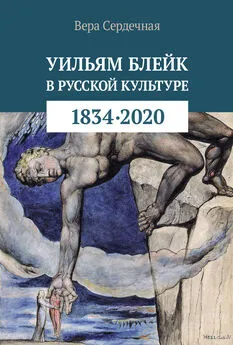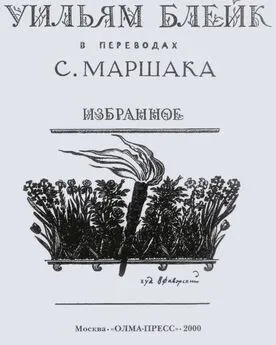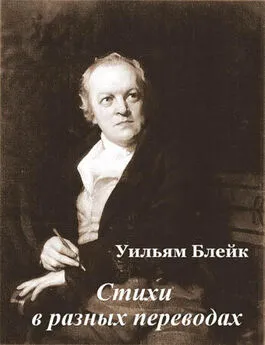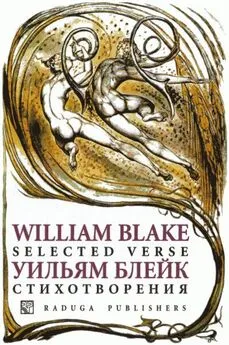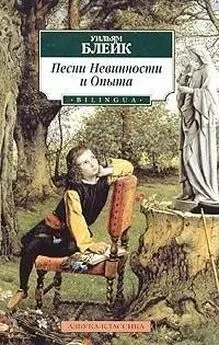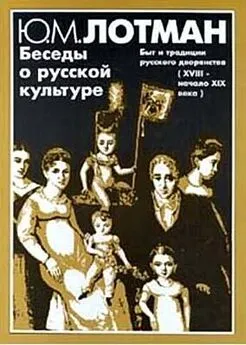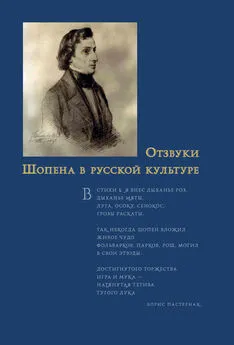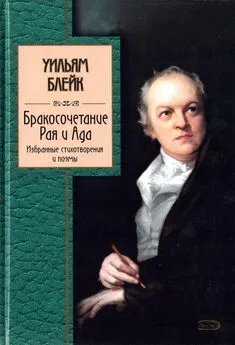Вера Сердечная - Уильям Блейк в русской культуре (1834–2020)
- Название:Уильям Блейк в русской культуре (1834–2020)
- Автор:
- Жанр:
- Издательство:неизвестно
- Год:2021
- Город:Москва
- ISBN:978-5-907220-82-9
- Рейтинг:
- Избранное:Добавить в избранное
-
Отзывы:
-
Ваша оценка:
Вера Сердечная - Уильям Блейк в русской культуре (1834–2020) краткое содержание
В формате PDF A4 сохранен издательский макет.
Уильям Блейк в русской культуре (1834–2020) - читать онлайн бесплатно ознакомительный отрывок
Интервал:
Закладка:
Затем Колридж пишет более пространное письмо сведенборгианцу Ч. Талку, знакомому Блейка, у которого и взял эту книгу. В нем он довольно серьезно критикует Блейка-рисовальщика: «Титул и следующее изображение совмещают всевозможные технические ошибки с <���…> немногими достоинствами» [39] «Title page and the following emblem contain all the faults of the Drawings with <���…> few beauties».
и пр. [там же, 55]. Колридж останавливается на стихах и по очереди оценивает их с помощью условных знаков: от 0 (наименее понравились) до θ (понравились в наивысшей степени). К последним относятся «The Divine Image», «The Little Black Boy», «Night». О некоторых стихотворениях Колридж высказывается подробнее, и эта критика производится с позиций жизнеподобия, что демонстрирует принципиальную разницу в творческом методе Блейка и озерной школы. В частности, в стихотворении «Infant Joy» он предлагает замену последних строк и пишет: «…двухдневный ребенок не может, не умеет улыбаться – и невинность, и истина природы должны совмещаться. Младенчество – слишком священная вещь, чтобы ее приукрашивать» [40] «a Babe two days old does not, cannot smile – and innocence and the very truth of Nature must go together. Infancy is too holy a thing to be ornamented».
[там же, 56]. Также Колридж критикует противопоставление холодной церкви и теплого паба в «The Little Vagabond».
Важен тот факт, что Блейк был совершенно незнаком Колриджу до этого времени, хотя тот вращался в гуще национальной культурной жизни с 1790-х годов. Причины малой известности Блейка состояли в том числе в его низком, ремесленном происхождении, в том, что он не попал в Королевскую Академию художеств [Erle, Paley, Introduction, 2019, 4], в причастности к религиозному движению диссентеров и в том, что гравер оставался низшей профессией в иерархии художественных занятий [Wiliams, 2006, 2–3].
Вместе с тем определенный интерес у современников Блейк вызывал – правда, больше не как поэт или художник, но как занятная личность, полусумасшедший или вполне сумасшедший духовидец, о котором можно было рассказывать анекдоты. В той или иной мере в этом духе писали о Блейке все современники: Бенджамин Малкин [Malkin, 1806], Джон Томас Смит [Smith, 1828], Аллан Каннингем [Cunningham, 1830] и Генри Крэбб Робинсон [Robinson, 1869].
Конец ознакомительного фрагмента.
Текст предоставлен ООО «ЛитРес».
Прочитайте эту книгу целиком, на ЛитРес.
Безопасно оплатить книгу можно банковской картой Visa, MasterCard, Maestro, со счета мобильного телефона, с платежного терминала, в салоне МТС или Связной, через PayPal, WebMoney, Яндекс.Деньги, QIWI Кошелек, бонусными картами или другим удобным Вам способом.
Примечания
1
«that critical category has now disappeared from view».
2
«the word 'romantic' has come to mean so many things that, by itself, it means nothing. It has ceased to perform the function of a verbal sign».
3
«Certainly those writers that are now thought of as a part of a Romantic movement in Britain never thought of themselves as such».
4
«And from these beginnings or causes <���…> that <���…> mode of imagination arose, which at length composed the marvelous machineries of the more sublime Italian poets, and of their disciple Spencer».
5
«He who seeks to define Romanticism is entering a hazardous occupation which has claimed many victims».
6
«A fruitful source of false definition is to take as primary in a more or less closely allied group of facts what is actually secondary – for example, to fix upon the return to the Middle Ages as the central fact in romanticism, whereas this return is only symptomatic; it is very far from being the original phenomenon».
7
«Romanticism as a problem might appear to be captured in the received historical narration of an initially post-enlightenment reaction against universalizing systems – the reduction of the world to so many units determined in advance – followed by recognition that the imagination's violence and chaos requires some forming of limits».
8
«I must Create a system, or be enslav'd by another Mans».
9
«failed Romantic <���…> the Enlightenment dissolved around him, but he retreated in fear to an early sixteenth-century position».
10
«modern poetry, in English, is the invention of Blake and Wordsworth».
11
«1. Man has no Body distinct from his Soul for that calld Body is a portion of Soul discernd by the five Senses. the chief inlets of Soul in this age.
2. Energy is the only life and is from the Body and Reason is the bound or outward circumference of Energy.
3. Energy is Eternal Delight» [Blake, 1988, 34].
12
«If the doors of perception were cleansed every thing would appear to man as it is: infinite. For man has closed himself up, till he sees all things thro' narrow chinks of his cavern» [Blake, 1988, 39].
13
«The worship of God is. Honouring his gifts in other men each according to his genius. and loving the greatest men best, those who envy or calumniate great men hate God, for there is no other God» [Blake, 1988, 43].
14
«Thus men forgot that All deities reside in the human breast» [Blake, 1988, 38].
15
«Jesus & his Apostles & Disciples were all Artists».
16
«Prayer is the study of Art.
Praise is the Practise of Art. <���…>
Practise is Art».
17
«Without contraries is no progression. Attraction and Repulsion, Reason and Energy, Love and Hate, are necessary to Human existence».
18
«There is a Negation, & there is a Contrary. / The Negation must be destroyd to redeem the Contraries».
19
«Negations are not Contraries: Contraries mutually Exist: But Negations Exist Not».
20
«The Negation of God constitutes Hell».
21
«The Eternal Body of Man is The Imagination. that is God himself / The Divine Body <���…> It manifests itself in his works of Art».
22
My soul is seven furnaces, incessant roars the bellows
Upon my terribly faming heart, the molten metal runs
In channels thro my fiery limbs: O love! O pity! O fear!
O pain! O the pangs, the bitter pangs of love forsaken
23
«Besides. let them look at gothic Figures & gothic Buildings, & not talk of Dark Ages or of Any Age! Ages are All Equal. But Genius is Always Above The Age».
24
«a Gothic Church is representative of true Art Calld Gothic in All Ages».
25
«Grecian is Mathematic Form. gothic is Living Form».
26
«by means а startlingly unorthodox first-person narrator, Blake conducts us – in a heterogeneous mixture of prose and verse, levels of discourse, points of view, and imagery – pass past ominous apocalyptic symbols as in a nightmare; but the cosmic vastness of the poem can as suddenly telescope into a wry dramatic exchange or monologue; and the disparate levels and contents are suspended in a narrative consciousness which, as a dream process contains all contradictions and derives its dynamics from its own paradoxical tension».
27
«the limits of the defining intellect».
28
To LORD byron in the Wilderness
What doest thou here Elijah?
Can a Poet doubt the Visions of Jehovah? Nature has no Outline:
but Imagination has. Nature has no Tune: but Imagination has!
Nature has no Supernatural & dissolves: Imagination is Eternity
29
«the metaphor that made most twentieth-century advances in the study of Blake possible: Blake is a poet».
30
«Collective intelligence is not just a strategy for Blake; it is a foundation of his ontology».
31
«The historical person named „William Blake“ is only one node in an increasingly complex society that continually defines and redefines what it is that is referred to when the name Blake is uttered».
32
«A prophet almost unknown in his own country, abroad Blake was scarcely recognized at all».
33
«whose works have been the subject of derision to men in general, but he has a few admirers».
34
«He was barely known to the writers such as Wordsworth and Coleridge with whom he is now yoked in anthologies of English poetry».
35
«a perfectly mad poem called Jerusalem».
36
«There is no doubt this poor man was mad, but there is something in the madness of this man which interests me more than the Sanity of Lord Byron & Walter Scott!»
37
«I have this morning been reading a strange publication – viz. Poems with very wild and interesting pictures, as the swathing, etched (I suppose) but it is said – printed and painted by the Author, W. Blake. He is a man of Genius – and I apprehend, a Swedenborgian – certainly, a mystic empathically You perhaps smile at my calling another Poet, a Mystic; but verily I am in the very mire of commonplace common-sense compared with Mr. Blake, apo- or rather anacalyptic Poet, and Painter!»
Читать дальшеИнтервал:
Закладка:
